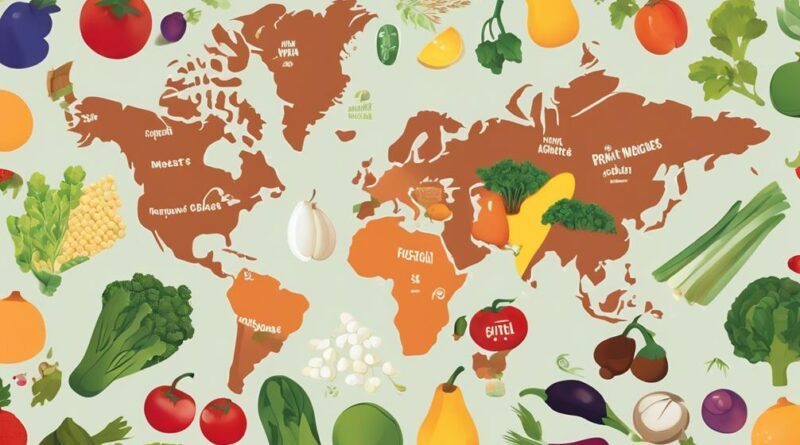What Is Globalization's Impact on Organic Products?
Globalization impacts organic products by shaping demand, pricing, regulations, and sustainability efforts. The interconnected global market boosts the popularity of organic goods, with sales hitting $50.1 billion in the U.S. alone. However, supply chains face challenges like trade barriers and diverse regulations. Embracing regenerative farming practices can enhance sustainability and profitability for organic farmers. Prices fluctuate due to global influences, impacting affordability and market entry. Standardization efforts and transparency are rising, enhancing consumer trust. This global landscape hints at broader implications for the organic industry and its stakeholders.
Growing Demand for Organic Products
The increasing preference for organic products among consumers reflects a shifting trend towards healthier and more sustainable choices in the global marketplace. Consumer preferences are evolving, with more individuals opting for organic goods due to various factors such as health consciousness, environmental concerns, and a desire for high-quality products. This shift in consumer behavior is driving significant market trends, shaping the landscape of the organic products industry.
Data shows a substantial increase in the demand for organic products in recent years. According to a report by the Organic Trade Association, organic food sales in the United States alone reached $50.1 billion in 2019, marking a significant surge compared to previous years. This trend isn't limited to the U.S.; globally, the organic market has been expanding rapidly, with Europe, Asia-Pacific, and other regions experiencing a notable uptick in organic product consumption.
Market trends indicate that the growth of the organic industry isn't just a passing fad but a fundamental change in consumer behavior. As more people become aware of the benefits of organic products and the potential risks associated with conventional alternatives, the demand for organics is expected to continue rising. Businesses are adapting to these consumer preferences by expanding their organic product lines and investing in sustainable practices to meet the growing market demand.
Supply Chain Complexities and Challenges
Amidst the rapid growth of the organic products industry, navigating the supply chain complexities and challenges poses a critical hurdle for businesses seeking to meet the escalating demand. One significant issue companies face is ensuring ethical sourcing practices throughout their supply chains. With consumers increasingly valuing transparency and sustainability, businesses must carefully vet their suppliers to guarantee that products are truly organic and produced in an environmentally and socially responsible manner. Failure to uphold ethical standards can lead to reputational damage and loss of consumer trust, ultimately impacting sales and growth prospects.
Moreover, trade barriers present another obstacle in the supply chain of organic products. International trade regulations, tariffs, and differing organic certification standards across countries can complicate imports and exports, affecting the smooth flow of goods. Navigating these barriers requires a deep understanding of global trade policies and a proactive approach to compliance. Companies operating in multiple markets must adapt their supply chain strategies to mitigate the impact of trade barriers, ensuring consistent access to organic products worldwide.
Changes in Organic Farming Practices
Leveraging innovative techniques in organic farming practices can enhance sustainability and productivity in the agricultural sector. One such technique gaining traction is regenerative agriculture, which focuses on restoring and improving soil health while promoting biodiversity. By implementing regenerative agriculture practices, organic farmers can sequester more carbon in the soil, enhance water retention, and reduce the need for external inputs like fertilizers.
Improving soil health is at the core of these changes in organic farming practices. Healthy soil teeming with beneficial microorganisms not only boosts crop yields but also contributes to the overall resilience of the ecosystem. Techniques such as cover cropping, crop rotation, and minimal tillage help maintain soil structure, prevent erosion, and foster a balanced soil microbiome.
Furthermore, embracing regenerative agriculture can lead to long-term benefits for organic farmers. Studies have shown that adopting these practices not only improves soil health but also increases farm profitability over time. By reducing reliance on synthetic inputs and promoting natural soil processes, organic farmers can create more sustainable and resilient farming systems.
Impact on Pricing and Affordability
Considering the increasing demand for organic products, understanding the impact of globalization on pricing and affordability is essential in assessing market dynamics and consumer behavior. Globalization has significantly influenced the pricing of organic products through various market trends and price fluctuations. As organic products become more popular globally, consumer preferences have shifted towards healthier and environmentally sustainable options, driving up the demand for organic goods. This surge in demand has led to fluctuations in prices, with some organic products becoming more affordable due to economies of scale and streamlined supply chains, while others may see price increases due to factors like transportation costs and market speculation.
Consumer purchasing power plays a crucial role in the affordability of organic products. In regions where incomes are higher, consumers may be willing to pay a premium for organic goods, leading to stable or increasing prices. However, in areas where purchasing power is lower, the higher prices of organic products may pose a barrier to accessibility. Globalization has also facilitated the entry of organic products into new markets, creating opportunities for price competition and potentially driving down costs in the long run.
To navigate these dynamics, it's essential for businesses and policymakers to monitor market trends, understand consumer behavior, and work towards ensuring that organic products remain accessible to a wide range of consumers despite the pricing challenges posed by globalization.
Influence on Organic Product Regulations
The globalization of organic products has exerted a significant influence on the regulations governing the production, certification, and labeling of these goods. As organic products are increasingly traded across borders, global standards have emerged to ensure consistency in production methods and labeling practices. These global standards aim to harmonize regulations across different countries, facilitating international trade of organic products.
One significant impact of globalization on organic product regulations is the push for equivalency agreements between different countries. These agreements recognize each other's organic standards as equivalent, streamlining the certification process and reducing barriers to international trade. For example, the United States has equivalency agreements with the European Union, Canada, and Japan, allowing organic products certified in these countries to be sold as organic without the need for recertification.
Furthermore, the rise of global standards has led to increased transparency and trust in the organic market. Consumers can now have more confidence that products labeled as organic meet certain criteria regardless of where they were produced. This transparency not only benefits consumers but also supports the growth of the organic industry on a global scale.
Environmental Implications and Sustainability
Globalization's impact on organic products extends beyond regulations to encompass the environmental implications and sustainability of the industry. When considering the carbon footprint of organic products, studies show that organic farming methods generally result in lower greenhouse gas emissions compared to conventional farming. This reduction is primarily attributed to the avoidance of synthetic fertilizers and pesticides, which are common in non-organic agriculture and contribute significantly to carbon emissions. By choosing organic products, you're indirectly supporting practices that help mitigate climate change.
Furthermore, biodiversity conservation is a crucial aspect of organic farming. Organic farms tend to promote biodiversity by avoiding the use of synthetic chemicals that can harm beneficial insects, birds, and other wildlife. This preservation of diverse ecosystems not only supports wildlife but also enhances the long-term sustainability of agriculture. Research suggests that organic farms have higher levels of biodiversity, which can lead to improved soil health, pollination, and pest control without relying on harmful chemicals.
Market Expansion and Competition

With the rise of global trade and interconnected markets, the organic products industry faces new challenges and opportunities in terms of market expansion and competition. Global distribution has become a key focus for organic product companies looking to grow their market share. By expanding distribution channels internationally, these companies can access a wider customer base and tap into new market segments. This global reach also allows organic products to be more accessible to consumers worldwide, driving demand and increasing sales.
However, with market expansion comes a more competitive landscape. As the organic products industry continues to grow, more players enter the market, intensifying competition. Companies are constantly innovating to differentiate themselves and stand out among competitors. This fierce competition can lead to improved product quality, better pricing strategies, and enhanced marketing efforts, benefiting consumers with a wider range of options to choose from.
Navigating this competitive landscape requires organic product companies to stay agile and adapt to changing market dynamics. Understanding consumer preferences, monitoring industry trends, and investing in research and development are crucial to maintaining a competitive edge. Overall, the market expansion driven by globalization presents both challenges and opportunities for the organic products industry, shaping the future of the sector in a rapidly evolving global market.
Consumer Awareness and Education
Navigating the expanding organic products market requires a deep understanding of consumer awareness and education levels to effectively cater to evolving preferences and demand trends. Consumer awareness plays a crucial role in shaping the organic products landscape. As shoppers become more informed about the benefits of organic goods, their demand increases, driving market growth. To meet this demand, companies must prioritize consumer education initiatives to ensure transparency and trust.
Labeling requirements are a fundamental aspect of consumer awareness. Clear and accurate labeling helps shoppers make informed choices about the products they purchase. Understanding these requirements and communicating them effectively can build consumer confidence in organic products. Moreover, emphasizing the health benefits of organic items is essential in educating consumers. Studies linking organic products to health benefits such as reduced exposure to pesticides and higher nutrient content are key selling points that can influence purchasing decisions.
Educating consumers about the advantages of choosing organic goes beyond marketing – it's about empowering individuals to make healthier choices for themselves and the environment. By investing in consumer education and adhering to stringent labeling requirements, companies can't only attract more customers but also contribute to a more informed and health-conscious society.
Conclusion
In conclusion, globalization has significantly impacted the organic products industry. The growing demand for organic products has led to supply chain complexities, changes in farming practices, and pricing challenges.
Regulations, sustainability concerns, and market expansion have all been influenced by globalization. As consumer awareness and education continue to increase, the future of organic products in a globalized world will depend on adaptation, innovation, and a commitment to environmental responsibility.
